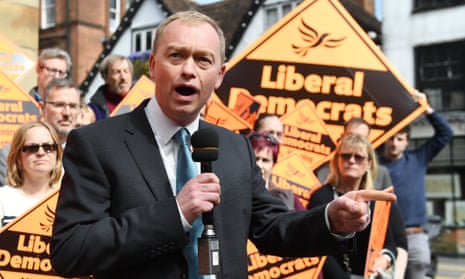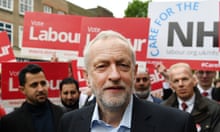A Liberal Democrat surge has failed to materialise in the party’s former south-west heartlands, though party insiders said an increase in its vote share still put it on course to make gains in key remain-leaning seats at the general election.
The party lost 28 seats overall on Friday but an upbeat Tim Farron said the Lib Dems had significantly increased their vote share in constituencies where they hope to win seats off the back of a Brexit backlash, including Oxford, Cambridge and St Albans.
During a rally in the Hertfordshire commuter town on Friday afternoon, Farron sought to motivate wavering Labour supporters to vote tactically for his party, warning of a Conservative landslide that would make Theresa May more powerful than Margaret Thatcher.
“Whatever you think about Brexit, however you vote, we should all be concerned,” he said. “The only plausible route for the Tories to lose seats is through the Lib Dems.”
In St Albans, a remain-voting constituency where the party is challenging Tory Brexiter Anne Main, five of its eight wards went Lib Dem in the Hertfordshire county council elections, a swing that the party predicts would be enough to win the seat in June.
Further party analysis of ward-by-ward vote shares has shown increases in support in other key target areas, including Bath and Eastleigh. However, the party has seen its expectations dampened by significant losses across areas of the traditionally liberal south-west such as Somerset and Devon, where campaigners had hoped for a resurgence despite the region’s strong leave vote.
The results there suggest Farron’s party is not picking up nearly enough of the remain-leaning Conservative voters that it needs in order to win back some of its former heartlands.
The disappointment was not confined to leave-leaning regions either. In Cardiff, where the party had hopes of taking the council, the Lib Dems lost seven seats, though the majority of its council losses have come in areas where the party’s stance on Europe is likely to be unpopular, including the Brexit heartlands of Lincolnshire where the party lost three seats and Cumbria where it lost seven.
However, the party has seen an increase in its projected national vote, up 7% from the general election to 18%, according to calculations by the BBC’s elections expert John Curtice. Farron said the party would “double our seats” if the projections were accurate. Projections based on local elections can be skewed, however, given that not all councils in the UK are holding elections.
Farron turned his fire on Labour on Friday, saying the results showed the party cannot win the general election. His comments are likely to be interpreted as meaning that the Lib Dems’ best hopes of a stronger performance in June may rest with converting Labour voters to vote tactically, rather than Tory remainers switching.
“If you want a strong opposition to this government, we are the party for you,” he said. “Labour has failed as an opposition and handed Theresa May a blank cheque to do as she pleases. The voters have delivered their verdict on Jeremy Corbyn.”
On Saturday, the Lib Dems will outline their flagship election spending pledge of an extra £6bn a year to the NHS and social care, paid for by an immediate rise of 1p on income tax. The income would be ringfenced to be spent only on the NHS and social care.
Norman Lamb, the Lib Dem health spokesman, said: “A penny on the pound to save the NHS is money well spent in our view.”








